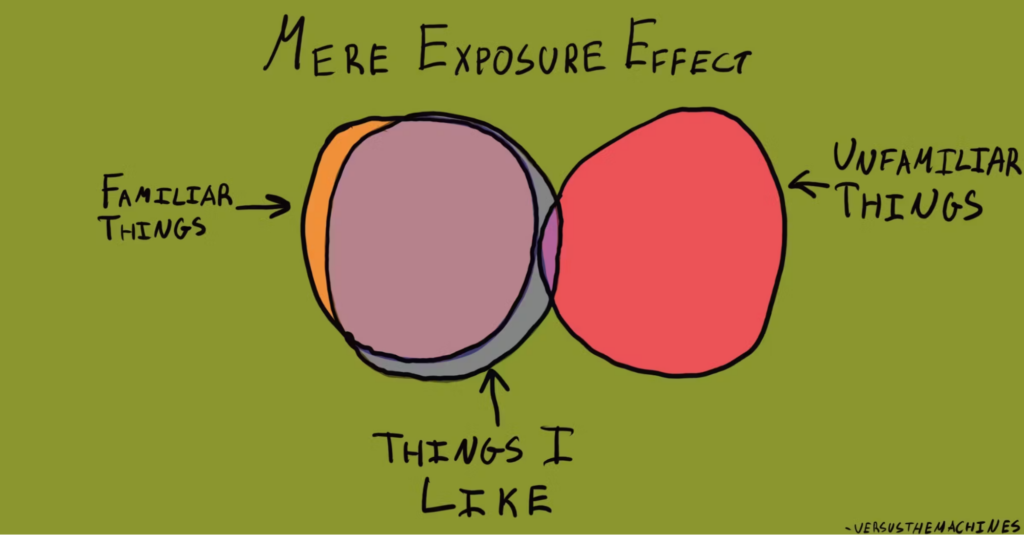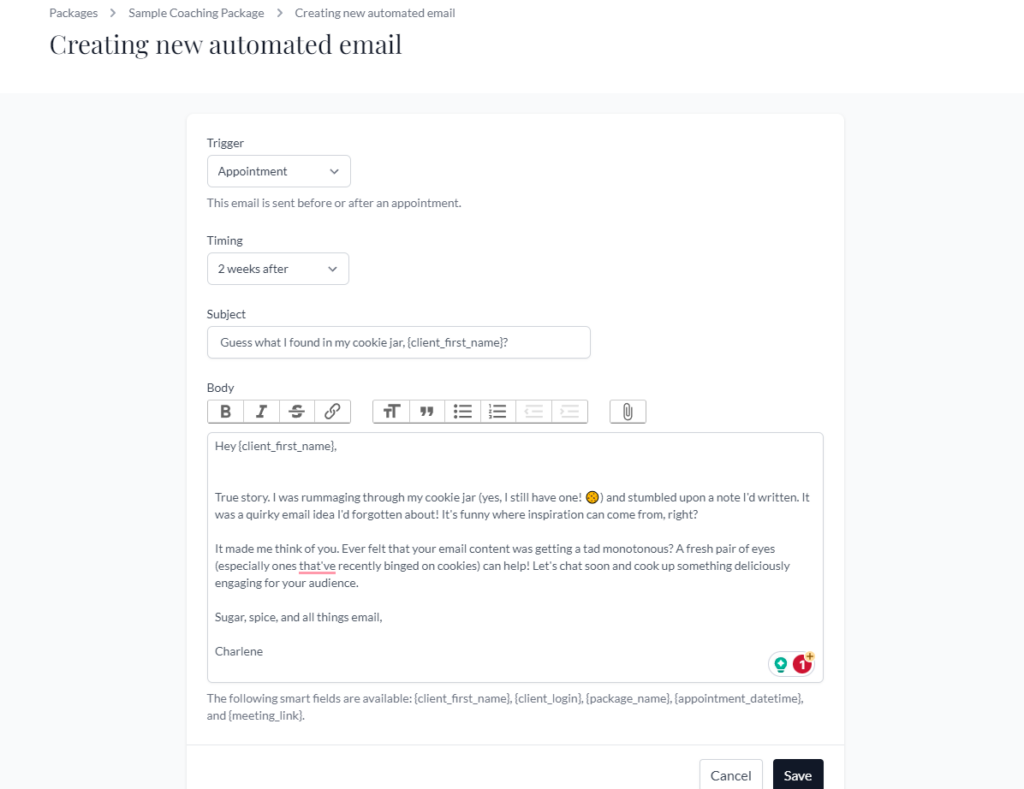If you want to be a successful coach, it’s not enough to just have great content or a flashy website.
You need to have top sales skills to attract and retain clients.
But what sales skills should you focus on? And how can you start dipping your toes into these skills in sales?
Keep reading to discover the complete list of sales skills for coaches, including:
- 8 hard sales skills for coaches
- 8 soft sales skills for coaches
8 Sales Hard Skills For Coaches
1. Habit stacking
One of the most powerful techniques for sales success is habit stacking. You can seamlessly integrate your services into their lives by combining your coaching offer with an existing habit or routine that your potential clients already engage in!
This approach allows you to position your coaching as a natural and essential part of their daily routine.
So, how does this concept work? Habit stacking is based on the idea that people are more likely to adopt new behaviors when they are tied to existing habits.
For instance, let’s say your potential client is already in the habit of waking up early every morning and going for a run. They have established a routine that involves lacing up their running shoes, hitting the pavement, and getting their daily dose of exercise.
Now, what would it look like if you could seamlessly integrate your coaching offer into this existing routine?
For one, you could create a coaching program specifically designed for early-morning runners. Your program could include personalized training plans, nutrition advice, and motivational support to help your clients optimize their running performance. By positioning your coaching as a natural extension of their existing habit, you make it easier for them to see the value in your services!
But you can adapt this principle no matter your coaching niche. For instance, you could create an early-morning meditation program if you’re a mindset coach!
By leveraging habit stacking, you can tap into social influence’s power. People are more likely to adopt new behaviors when they see others around them doing the same. This is called the mere exposure effect.

This means you can tap into each client’s network to access a whole community of potential clients. All you need to do is ask for a referral if they know anyone else who shares these habits and boom! You’ve just used your sales skills and habit stacking to grow your business.
2. Strategic prospecting for coaching client leads
Prospecting for clients is one of the top skills for sales reps, let alone running your own business. And online coaching is no exception.
But there’s a difference between strategic prospecting and “throwing spaghetti at the wall” prospecting. So, let’s go through an example of what both of these can look like.
First, here’s what “throw spaghetti at the wall” prospecting used to look like for me:
- Log into LinkedIn
- Scroll through my feed until I see someone who fits my ideal client avatar
- Send an invitation to connect with that person
- Rinse and repeat whenever I feel like it
Not great. As you can imagine, this approach makes it difficult to predict how many people I’m prospecting each day.
Now let’s contrast to a more strategic and intentional prospecting process:
- Join Facebook groups that are filled with my ideal client avatar (in my case, it’s people who are running Facebook ads to grow their email lists)
- Look through new and active members of the group each day
- Screen each member depending on their profile (do they look like a high-level coach already making 7+ figures per year?)
- Add them as a friend
- Rinse and repeat until I’ve added 25 people daily
So why is the second approach better? First, I’m actively searching for my ideal client avatar instead of passively scrolling through social media and wasting my time. I’m also setting a specific goal I need to reach daily before I’m “done.”
Remember that adding people as friends on Facebook alone isn’t a solid prospecting strategy. You need to do something in your sales process with these people. In my case, I’m posting content 3-5x a week to build a coaching brand so that people reach out when they’re ready to work with me.
So now, let’s apply this to your coaching business so that you can start building your prospecting skills. First, take the time to identify your target audience and create a strategic prospecting plan to reach them where they are. This could include:
- Networking
- Social media outreach
- Content marketing
- Collaborations with other influencers in your field
- Cold email outreach
- And much more!
One thing is certain – you won’t get better at your prospecting skills if you don’t do it. So, set some time aside daily for intentional prospecting right now. Over time, those skills will compound as you build your network and coaching lead list!
3. Staying top of mind
It’s so easy for potential coaching clients to forget about you amidst the sea of competing coaches. That’s why knowing how to stay top of mind is essential to a healthy sales pipeline.
Luckily, there are several ways you can stay top of mind. Some of them involve marketing skills, such as:
- Blog posts
- Social media updates
- Email newsletters
By consistently delivering value and positioning yourself as an authority in your niche, you will build trust and stay at the forefront of your potential clients’ minds.
But staying top of mind isn’t just about marketing – it’s also a sales skill. You need to learn how to keep in touch with every person that’s in your sales pipeline so that they don’t forget about you.
To work on this skill, consider getting a CRM platform so that you have a baseline capacity to stay in touch with everyone who has entered your ecosystem. A CRM will allow you to keep track of leads and coaching clients across every communication channel you use.
Once you have a CRM, you can implement a daily schedule to stay top of mind with everyone. At first, this can involve manual tasks such as:
- Following up every few days via email to people who didn’t show up to their free discovery calls
- Scrolling through your DMs to see which conversations you can spark back to life
- Making sure you’re following up with people who did show up to free discovery sessions but who didn’t purchase or say no yet
- Occasionally circling back to people who previously said no to coaching because it wasn’t the right time for them yet
But over time, as you learn what people respond to best, you can start automating some of these processes. By the time you automate your follow-ups, your sales skills will be much stronger than they are today!
Here are some ideas on how to automate your follow-up process to stay top of mind with every lead:
- Add flows and tasks in your CRM to remind you to follow up with DM conversations after a certain number of days
- Use your email autoresponder to follow up with people who didn’t show up to a call for an entire year post-call
- Use Paperbell to create a follow-up sequence for everyone who booked a free coaching session with you to encourage them to re-ignite the conversation:

Remember, staying top of mind is not just about bombarding your potential clients with promotional messages. It’s about providing value and building a genuine connection.
Because once they’re ready to invest in coaching, they’re more likely to buy from the person they truly feel connected to – at that moment.
4. Buyer-responsive selling
Effective selling is about more than just delivering a pitch. It’s about understanding your client’s needs and tailoring your approach accordingly.
And that’s what a buyer-responsive selling strategy is all about! You can ask probing questions to uncover your client’s pain points and then position your coaching as the solution.
This is especially important if you have more than one coaching package. You need to stay open-minded about where the conversation will go, depending on what your potential client needs. Instead of trying to absolutely sell Package A at all costs, consider offering Package B if it’s a better fit for that person.
By focusing on the client’s needs and desires, you will build a strong rapport and increase the likelihood of a successful sale… but also increase the likelihood of a successful client!
5. Storytelling
Humans are hardwired to connect with stories, so use the power of storytelling to sell your coaching services!
Share compelling anecdotes and case studies that illustrate the results your clients have achieved through your coaching. These stories will captivate your potential clients and help them envision the transformation they can experience by working with you.
If you want to dive deeper into this sales skill, I highly recommend reading Building a StoryBrand by Donald Miller. And if you’ve got a bigger budget, I also highly recommend investing in Dan Kennedy’s Magnetic Story Selling book and courses.
6. Copywriting
A well-crafted sales page or email can make all the difference in converting leads into clients. That’s why copywriting is one of the most valuable skills needed for sales!
There are countless free and paid resources to help you level up your copy skills. But you can start with our copywriting for coaches article if you feel overwhelmed.
Here are some of my favorite copywriting resources (from free to cheap to expensive):
- The free preview of Copy School by Copy Hackers
- Copywriting 101 by Copyblogger (free)
- The Ultimate Sales Letter book by Dan Kennedy ($9.95 for shipping, or free on Kindle Unlimited)
- Copyblogger Academy ($449 per year)
- The full version of Copy School by Copy Hackers (admittedly, a bit overkill for coaches who just want to write for themselves.) ($97 per week)
7. Research and information gathering
Being well-informed about your potential clients, industry trends, and competitive landscape is essential for sales success. That’s why you need to practice your research skills if you want to become an effective salesperson in your own coaching business!
Take the time to research your clients’ businesses or personal goals so that you can offer tailored solutions. Stay updated with industry news and trends to position yourself as an authority and provide valuable insights to potential clients.
Knowledge is power, and thorough research will set you apart from the competition.
8. Closing
The ultimate goal of any sales conversation is the ability to close deals and convert leads into clients. That’s why you’ll need to learn effective closing techniques and develop a sense of timing to know when to ask for the sale.
Confidence, clear communication, and a strong belief in the value of your coaching are essential in the closing process… but developing your closing skills will also help.
Remember, closing is not about being pushy! Instead, it’s about providing clarity and guidance to help potential clients make an informed decision.
8 Sales Soft Skills For Coaches
1. Knowledge of your coaching offer
Before you can effectively sell your coaching services, you must have a deep understanding of what you offer. Take the time to fully grasp the unique value you bring to your clients and how you can help them achieve their goals.
This knowledge will give you the confidence and credibility you need to pitch your services with conviction.
And here’s the thing: having a general understanding of the industry or a vague idea of what you can offer isn’t enough. You’ll need to dive deep into your expertise and truly understand the unique value you bring to the table. This means knowing your coaching niche inside and out, understanding the specific challenges your clients face, and having a clear vision of how you can help them overcome those challenges.
One way to better understand your coaching offer is to reflect on your own experiences and expertise. What are your strengths? What unique skills or knowledge do you possess that sets you apart from other coaches? If you don’t know, ask your current clients!
And if you don’t have any clients, you’ll need to ponder a bit longer on the question.
Another aspect of understanding your coaching offer is knowing your target audience. For instance:
- Who are your ideal clients?
- What are their pain points and goals?
- What keeps them up at night?
- What do they dream of accomplishing yet believe they can’t ever do?
By gaining a deep understanding of your target audience, you can tailor your coaching services to meet their specific needs. This level of personalization will attract more clients and increase your effectiveness as a coach.
2. Effective communication
You cannot sell anything effectively – let alone coaching – if you struggle with your communication skills. You must be able to clearly articulate your services, benefits, and results to potential clients.
This means speaking their language, addressing their pain, and demonstrating your expertise. But it also means understanding what someone isn’t necessarily telling you.
When you can read between the lines, you’ll become much more effective at qualifying and closing coaching clients. That’s because you’ll be able to ask the right follow-up questions and feel for any resistance they might have that they’re not being upfront about.
Remember, sales communication skills are a two-way street, so be sure to actively listen to your client’s needs and concerns throughout the entire sales process.
3. Negotiation skills
Negotiation is one of the best skills for sales. There’s no way around that. That is why knowing how to navigate pricing conversations, handle objections, and secure win-win outcomes is an invaluable sales skill.
The best way to build negotiation skills is just to get out there and practice during your sales calls. But in between your calls, I suggest reading these two books:
- Never split the difference by Chris Voss
- The art of negotiation by Tim Castle
These two books alone will completely change how you approach your sales negotiations!
4. Conflict management
As an online coach, you will inevitably encounter conflicts or challenging situations with clients and potential clients in your sales pipeline. Developing strong conflict management skills is essential to maintain positive client relationships and protect your reputation.
For example, I almost always get hate comments when launching a new Facebook ad campaign. Sometimes, it’s as silly as a comment on my blue hair.
For conflicts like these, there’s no use in pouring fuel on the fire. You’re better off deleting and ignoring comments like that. But what happens in a more sticky situation? For instance, what happens if a potential client gets upset at your pricing?
Unless you want negative backlash, it’s not a good idea to make fun of or antagonize people complaining about your coaching packages’ price. That’s where conflict management skills come in handy!
To further develop this skill, I recommend reading Hug Your Haters by Jay Baer.
5. Objection handling
Objections are a natural part of the sales process but should not be seen as roadblocks. Instead, view objections as opportunities to address concerns and showcase the value of your coaching.
You should anticipate common objections, such as price or time commitment, and have well-prepared responses demonstrating your coaching packages’ benefits and outcomes. The more you practice, the more you’ll learn about the common objectives that are specific to your ideal clients.
By confidently addressing objections, you will instill trust and counter potential clients’ hesitations. But you’ll also help your coaching clients along their journey – because many objections can be excuses they’re making that are stopping them from achieving what they really want.
For instance, a common objection from email coaching clients is that they think people will get annoyed at them if they send emails. That’s an opportunity for me to work through that fear with them and remind them that their subscribers opted into their list to hear from them.
6. Empathy
Empathy is a quality that every online coach should possess… sales or no sales. Empathizing with your potential client’s challenges and emotions will allow you to build trust and establish meaningful connections.
Show genuine care and understanding for their struggles, and demonstrate how your coaching can support them. Putting yourself in their shoes will create a welcoming and supportive environment for your clients.
The more sensitive your coaching niche, the more this skill will be important during the sales process. For instance, if you’re dealing with cancer recovery, divorce, or grief coaching, you’ll need to display enough empathy so potential clients feel safe to embark on this journey with you.
7. Curiosity
Curiosity is a powerful sales skill that can help you uncover potential client’s needs and desires. If you’re not curious about your potential coaching clients’ lives and situations, you must work on that ASAP!
Approach every interaction with a genuine curiosity about your client’s goals, challenges, and motivations. Ask thoughtful questions and actively listen to their responses.
Curiosity will give you more than enough information about every person in your sales pipeline. Once you have that information, you can easily counter objections and match the right people to the right offers.
8. Business acumen
To succeed as a coach, especially if you’re doing your own sales, you must have a solid understanding of the business side of coaching.
You should familiarize yourself with topics such as:
- Financial management
- Marketing strategies
- Sales techniques specific to coaching
- Coaching business models
Develop a growth mindset and continually seek opportunities to learn and improve your business acumen. By understanding the broader context of your coaching business, you will be better equipped to make informed decisions and achieve long-term, sustainable growth.
Develop Your Skills For Sales To Grow Your Coaching Business
You now know which sales skills you need to focus on if you want the best chance of success as a coach! As you can see, sales requires a blend of soft and hard skills.
And it can take a lifetime to master.Need to streamline the admin side of your coaching business so you have more time to improve sales skills? Then try Paperbell! This all-in-one coaching platform automates the repetitive tasks in your coaching business so you can focus on developing yourself and serving your clients on a deeper level. Grab your free account right here to give it a try!










